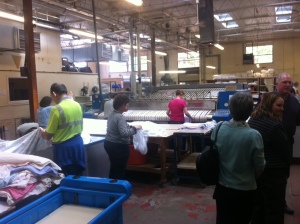Andrew Lansley was continually challenged by a frequently angry audience during last week’s Question Time debate. The Health and Social Care Bill has been pushed through at break neck speed. I sense a genuine fear of what looks like an increasingly inevitable outcome – a similar experience to that of the DWP’s Work Programme; great promises of a meaningful and modernizing role for the third sector but a reality where a small number of big businesses dominate. After all they are well capitalised, capable of achieving huge economies of scale, too big to fail, and they will of course deliver the efficiencies we all so desire and desperately need. After all, it did work with the energy sector, bus and rail de-regulation didn’t it? No.
Excessive profiteering, as we have seen in all of these areas, occurs when there are too few competitors, not when there are too many. Unfortunately Whitehall often has a very short memory.
A revolution in commissioning was promised by the last government, as it is by the current. Waiting for a great leap forwards in commissioning is likely to be the equivalent of waiting for a gentle and delicate Wayne Rooney to emerge out of the tunnel at Old Trafford. Chris White’s Bill could play an important role in evolving commissioning but it won’t create the revolution we need all by itself. Strong US style anti-trust laws might help protect against the natural yet damaging monopolies that form when policy and commissioning favours only big business.
What’s more likely to have an impact is the sort of collapse of faith in big business ethics by consumers and more importantly voters that the protests across the world over the weekend suggest is beginning to emerge. Before last Thursday’s Question Time debate got going there was a fascinating story about the 99% campaign camps set up in US towns and cities. From humble beginnings and a simple gathering on Wall Street, the movement has spread rapidly and appears to be developing rapidly across the UK too. The protesters call it a movement rather than a protest and are calling for a conversation on rampaging social and financial inequality. The campaign is centred on business ethics; excessive profiteering by global companies, business being bailed out by tax payers, avoidance of tax, over-exploitation of our natural resources and our communities.
It’s perhaps captured an underlying public mood – one that is growing, particularly in the developed world. Business has to change the way it operates; the siphoning off of ever-greater profits to a small, exclusive, globally-mobile elite must stop. The protestors argue that governments around the world have been far too complicit in enabling this globalized business culture to grow unchallenged. Now you’ll know from my last blog that I’m in favour of working with corporate partners where a meaningful relationship can be developed but the opportunity to co produce with value-driven businesses tends to be a growing yet still marginal opportunity rather than the norm – particularly within the foggy world of international capital and trading markets.
I’m currently travelling back from a meeting with PM training in Stoke on Trent. They work with around 1000 people each year providing training and high quality apprenticeships. I’ve blogged about them before. They’ve grown from a £2m to a £7m business in a short while. Last year 95% of their trainees (most of whom have faced multiple challenges in their early lives) completed their courses and, most importantly, secured work. It’s an inspiring organisation that continues to buy up private businesses and convert them into social enterprises. They have 42 homework teams providing garden and home maintenance to 5000 households of elderly and disabled people each year. They show exactly what can be done by socially-driven local businesses. In terms of outcomes they are capable of completely outperforming any big corporate and yet they are excluded from a range of government procurement opportunities because of their modest size or because the business case for them acting as sub-contractor-to-prime just doesn’t stack up. A report in the Mail on Sunday shown to me by Will, PM’s Chief Exec exposed how the apprenticeship programme is simply using taxpayers’ cash to provide existing staff within the big supermarkets with training labelled as adult apprenticeships rather than creating new jobs and training opportunities. It said that Asda alone has 25000 taxpayer-supported adult apprenticeships on the go, and not a single new job created as a result. Can’t the big supermarkets afford the cost of their own staff training? Wouldn’t it be better value to invest in the like of PM Training to expand their excellent work – safe in the knowledge that any profit they generate from public money would get reinvested into local communities, job creation and growth?
Is it any wonder people are angry on Question Time and taking to the streets in cities across the world?
Things aren’t changing fast enough and without much more ambitious thinking we know we will end up with more business-as-usual. The localism agenda needs to get a whole lot more radical. Collectively social enterprises must engage with the public and explain that they are part of the economic solution our world and our communities desperately need. Our new ‘Society Profits’ campaign aims to enable social enterprises and their supporters across the UK to do just that. Join our campaign, spread the word and show the angry and frustrated citizens around the world that a new, fairer economy can and will exist if we all collectively demand it. As you know that new economy must be built with social enterprise at its foundations.

